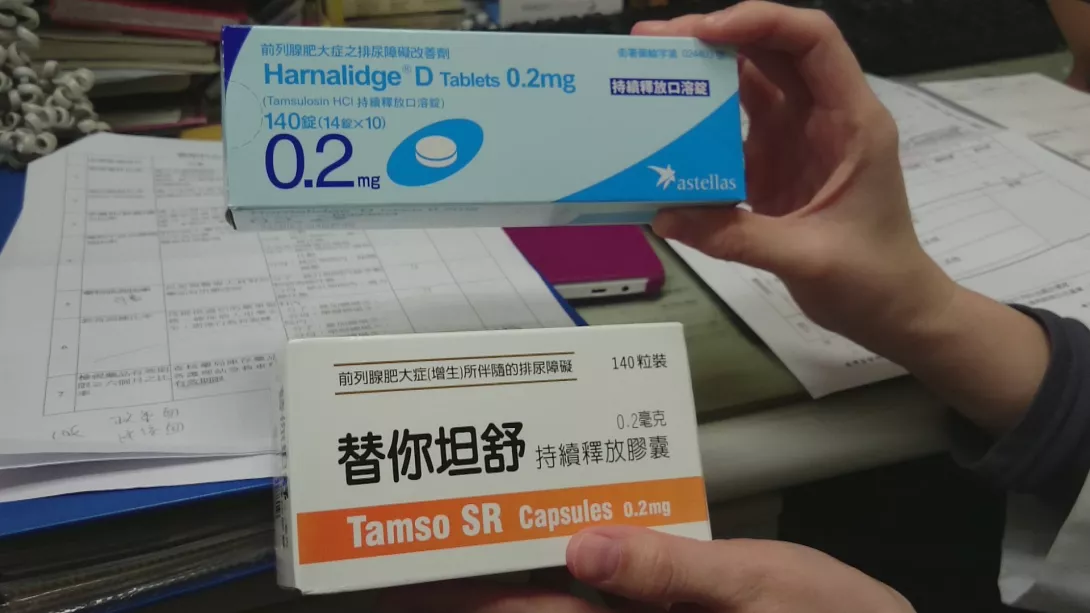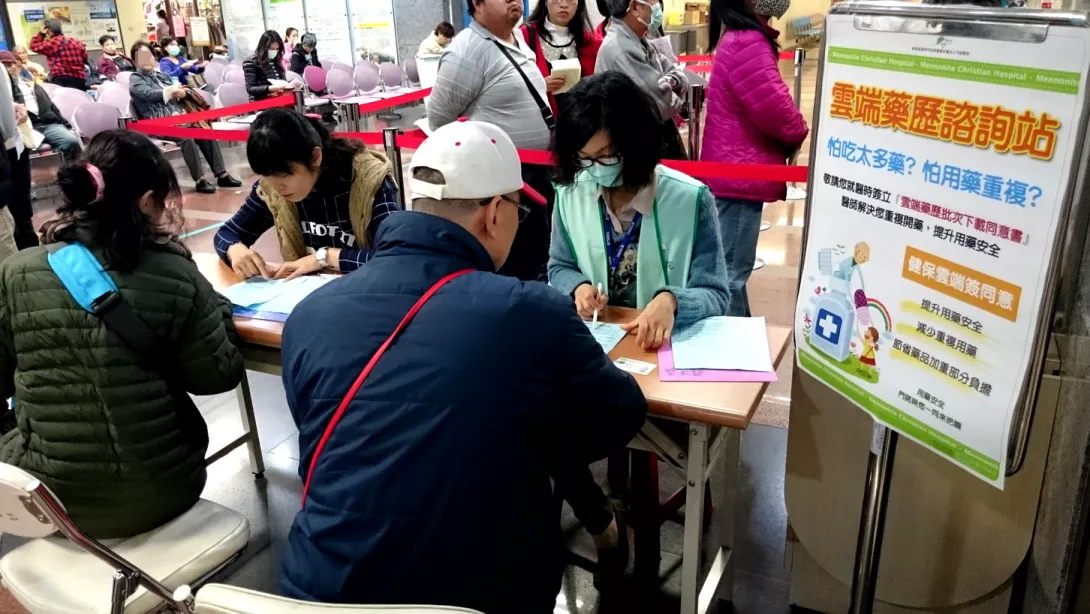全民雲端藥歷之前 該了解的幾件大小事
What you need to know about the National PharmaCloud Program
Region: Hualien City, Hualien County, Taiwan
Category: Social Concerns, Education and Learning, Life & Entertainment
Tags: Mennonite, Cloud, PharmaCloud, Elderly care
新聞編採:

志工譯者:謝安琪(Volunteer Translator: Angela Hsieh)
配音旁白:羅綺梅
嗯!雲端藥歷?那是甚麼?
Oh! PharmaCloud? What is that?
先假設一個情境好了,住花蓮的你帶著病體出差,卻忘了把你的藥一起帶著,在台北感到身體不適的你,在開會的前一天就先掛號就診,在看診那一天醫師會打開「雲端藥歷系統」跟你確認,前幾天你正在用的那些藥,應該還有幾天的份量可用,醫師看著系統上的藥品欄與用量,於是他決定開同樣的藥品給你,讓你的治療用藥有更高的延續性,差別只在於台北的醫師開給你的藥量,可足以讓你在台北的這幾天安然的開完會返家,返家後讓你可以繼續把花蓮的藥吃完。當然這是在雲端藥歷完全成立的狀況下(這是最理想的狀態!)以往就比較像是,兩個醫師開的藥雖然都是針對感冒,但藥錠與用量卻都不盡然相同,這當中也可能(雖然也不見得)出現藥品之間有交互作用的狀況,但是重複開藥對於藥品資源卻是一種浪費。
Let's first imagine a scenario: you live in Hualien and need to go on a business trip while still sick. However, you forgot to bring your medicine along. In Taipei, you still feel sick and need to see a doctor just on the day before the scheduled meeting date. The doctor will turn on the "PharmaCloud system" and confirms with you the names and available quantity of the medicines you were using several days ago. The doctor looks at the medicines and dosages, and he decides to prescribe the same medicines for you, which will allow for continuity in your therapeutic medicines. The difference is that the quantity prescribed by the doctor in Taipei will be just enough for you to take during the meeting period before going home. After arriving home, you can continue to take the medicines in Hualien. The precondition, of course, is a completely established PharmaCloud system (This is the most ideal state!). The alternative currently is: although two doctors both prescribe medicines for cold (influenza), the type and dosage might be different, so that Drug-Drug Interactions (DDIs) may (or may not) occur. But the duplicated prescription is a waste of medicine resources.

↑就算只是一個咳嗽或感冒,你就有機會吃下許多不同的藥錠,這些藥錠若能投過一套有效的整合系統,除了可以減少相對應的重複用藥,或是兩兩之間有藥物交互作用風險的藥品,除了可以減少藥物資源的浪費,對於減輕病人身體代謝的負擔也有很大的幫助。(圖:葛晶瑩小姐提供)
↑You may end up taking different drugs (lozenges) even just for a coughing or influenza. If the information on these drug prescriptions can be integrated into an effective system, not only can it reduce the corresponding redundancy in medication distribution, prevent complications from taking two medicines with DDIS, but also help to reduce burden on the patient's metabolism. (Picture: Ms. Ge, Jing-Ying)
了解個資簽署與否及雲端藥歷的推廣狀況
Understanding of personal information consent and the rollout status for the PharmaCloud program
雲端的應用已經悄悄地改變了我們的生活,健保署今年也開始與各地的醫療院所一起推動「雲端藥歷」計畫,希望讓民眾看病時,可以獲得醫師以及藥師更豐富的用藥判斷,減少民眾重複用藥以及避免交互用藥的風險,簡而言之「雲端藥歷」是一種「跨院際」、「跨區域」的線上資訊平台,有別於以往各醫院之間封閉的狀況,這個系統可讓所有參與雲端藥歷的醫療院所,在民眾的簽署同意之下,得以瀏覽民眾前三個月的用藥歷程,讓民眾看病時,讓醫師以及藥師得以根據他過去的用藥清單,減少重複用藥以及避免用藥交互作用的風險,也可以樽節藥品資源的不當浪費。「雲端藥歷」顧名思義就是要下載病人過去三個月的用藥歷程做為判讀資訊,因此在實際的臨床運用之前,第一個關卡,就是要先解決「個資保護法」的規範,第一階段健保署是委由各醫院自行收集病人同意書來進行,讓民眾於看診時可以選擇簽署與否。在資訊的讀取方面,當有必要時,只有在民眾簽署同意書之後,醫療單位必須同時配搭醫師或藥師的醫事人員卡,以及民眾的健保卡,在雙重認證的環境下方可讀取使用,資訊安全上也有一道保障。
The application of Cloud systems has quietly changed our life. This year, the National Health Insurance Administration (NHI Administration) has started to co-promote the "PharmaCloud" program with local hospitals and clinics. This is so that when people go to a medical clinic, doctors and pharmacists have access to more information for making medication judgment, to reduce duplicate prescriptions and avoid the risk of DDIs. In short, the "PharmaCloud" program is a kind of "cross-hospital", "cross-region" online information platform. Different from previous closed intra-hospital systems, with patient's signed consent, this system allows all hospitals and clinics who participate in the PharmaCloud program to review the patient's medication history up to the past 3 months. When the patient goes to a doctor, based on the patient's past medication list, the doctor and pharmacist can reduce duplicate prescriptions and avoid the risk of DDIs, also economize unnecessary waste of medicine resources. The name "PharmaCloud" implies downloading the patient's medication history for the past 3 months as the basis for assessment and diagnosis. For that reason, before actual clinical application, the first barrier is to meet the requirements of the "Personal Information Protection Act". At the first stage, the NHI Administration authorizes each hospital to collect patients' consent forms to proceed based on whether patients signup during their hospital visits. Concerning information retrieval, when it's necessary, only when the consent form is signed, a double-authorization process is required to read and use the information: the medical department must submit both the doctor's or the pharmacist's medical staff ID and the patient's NHI IC card. This will be one more protection for information security.

↑目前雲端藥歷推廣的第一階段(推廣與收集病患個資同意書)在衛福部健保署的規範下,由各地區醫院自行推廣收集。(左:臺北醫學大學附設醫院,右:花蓮基督教門諾會醫院的宣傳海報)
↑ Currently, the first stage in promoting the PharmaCloud program (to promote and to collect the consent of patient's personal information). Under the regulation and norms of NHI Administration, Ministry of Health and Welfare (MOHW), each hospital voluntarily promotes and collects in the local region. (The campaign post- Left: Taipei Medical University Hospital; Right: Hualien Mennonite Christian Hospital)
關於減少重複用藥以及藥品交互作用的機會
On reducing the duplicate prescription and chance of DDIs
除了樽節藥物的資源,雲端藥歷推行的另一個重要目的,就是檢視民眾的用藥歷程,以便減少重複用藥以及藥品之間的交互作用,尤其在偏鄉地區,老年人口居高,65歲以上並合併「三高」症狀的長輩,常常必須配搭使用許多慢性用藥,跨科看診的結果,常常出現藥物重複使用或是各藥品之間有相互作用的情況,不僅藥沒吃好對於病況也不見得有太大的幫助。藥劑師鄭育宛也舉例說明,如果長輩同時有心臟方面以及腦神經內科的病症,就有可能跨科、跨醫院看診拿藥,例如治療癲癇的Phenobarbital(苯巴比特魯錠)就會和治療心臟疾病的Warfarin(可化凝或稱歐服寧)有交互作用,Phenobarbital會減弱Warfarin的治療效果,讓心臟治療的效果不彰,因此如何降低這樣的交互抑制的情況,這也是雲端藥歷資訊平台可以在當中發揮作用的好處。
Apart from economizing the medicine resources, another important purpose to promote the PharmaCloud program is to examine patient's medication history, in order to reduce duplicate prescriptions and the DDIs. Especially in rural areas where more elder populations reside, senior citizens above 65 years old and who have combined with "three-high" syndromes usually take many medicines for chronic diseases. Duplicate prescriptions or DDIs situations often result from visits to different hospital departments. It's not only a problem of the medicine not being taken properly, but it’s also less effective for disease treatment. Pharmacist Cheng, Yu-Wan cited an example: if the elder has heart / cardiovascular and cranial nerves related diseases at the same time, it's possible to be prescribed medicines from different departments and hospitals. For example, the "Phenobarbital" for epilepsy treatment has DDIs with "Warfarin" for heart / cardiovascular diseases. "Phenobarbital" can weaken Warfarin's treatment effectiveness, which results in poor outcomes from heart / cardiovascular treatment. Hence, reducing such reciprocal inhibition is also a benefit that the PharmaCloud information platform can offer.

↑藥劑師表示,Phenobarbital(左)會與Warfarin(中、右)產生交互作用,在同時使用的情況下,Phenobarbital會減少Warfarin在心臟疾病治療的藥效。
↑Pharmacist explains how Phenobarbital (left) has DDIs with Warfarin (middle, right). When both medicines are taken at the same time, Phenobarbital will decrease Warfarin's effectiveness at treating heart / cardiovascular disease.

↑年紀較大的朋友,常常也會有前列腺肥大的問題,但因為藥廠的不同,有時候也會有產品名稱的差異,照片為同劑量(0.2mg)的Hamalidge以及Tamso,兩者都是治療前列腺大的用藥,雖然這兩種藥品都是必須經過醫師開立的處方用藥,但民眾在家使用藥品時,也可能會發生用藥混淆的困擾,也變成一種資源浪費。
↑Prostatic hyperplasia is also a common problem for elder populations. However, the product names sometimes are different due to different pharmaceutical manufacturers. The photo shows Hamalidge and Tamso with the same dosage (0.2mg). Both medicines are used to treat prostatic hyperplasia. Although these two medicines both need to be prescribed by doctors, people might be still confused when they take the medicines at home, which can also result in waste of resources.
雲端資訊平台尚待補強的空間
Potential remains for cloud information platform to be enhanced
即使雲端藥歷的推行在多方面是令人期待的,但是目前在功能上還有一些需要補強的地方,藥劑師鄭育宛表示,雲端藥歷除了必須先取得病患的個資同意簽署之外,在資料下載分析還有一項很重要的前提,那就是必須在看病的前一天12:00前完成掛號,醫院系統才會下載分析近三個月的藥歷資料,若簽署過藥歷同意書的病人是現場或當天掛號,除了無法取得整理分析後的病患用藥比對資訊,還必須當場使用在以醫師的醫事人員卡,配搭民眾的健保卡,才能以單筆的方式去檢索前三個月的用藥歷程,但是對於醫師與病患來說,這無異於海底撈針耗時費力,也不是雲端藥歷資訊的初衷。
Even though the promotion of PhramaCloud is much anticipated in many ways, currently, some functions still await enhancements. Pharmacist Cheng, Yu-Wan said that apart from obtaining the patient's signature on the consent of personal information in advance, there is a very crucial precondition for downloading & analyzing the information from the PharmaCloud system, which is that the patient registration needs to be done by 12:00 on the day before the hospital visiting date. Only then can the hospital system download and analyze the medication history within the latest 3 months. If the patient who has signed the medication history consent form just registers on-site or on the same day of hospital visiting, that not only is it not possible to retrieve the complete comparative analysis of patient medication information, but also requires on-site use of the doctor's medical staff ID with the patient's NHI IC card to search the past 3 months medication history one entry at a time. For both the doctor and the patient, it is just like to fish for a needle in the haystack, very time- and labor- consuming, and is not the design intent of the PharmaCloud program.

↑以往沒有雲端藥歷資訊時(上圖畫面),醫師在民眾藥歷的判讀上,只能透過健保IC卡上面記錄最近六次的就診紀錄,以及最多60筆的醫令資料,還必須醫師的經驗單筆的去比對這些資訊,除了比對不易,也無法事前知道病患的用藥狀態,雲端藥歷資訊則是向前推展三個月的用藥資訊,讓醫師對病患的用藥狀況與需求有更全面的掌握。
↑ (photo above) Prior to PharmaCloud data, to judge patient's medication history, the doctor can only base on the latest 6 hospital visits recorded on the patient's NHI IC card, and medical information up to 60 entries, dependent on the doctor's experience in comparing each entry in this data. Not only is it difficult to compare, but also impossible to know the patient's medication status in advance. The PharmaCloud information content includes medication history dated back for 3 months, which allows doctors a more comprehensive grasp of patients' medication status and needs.
藥劑師鄭育宛也說,另一個問題就是自費項目的藥品在這一個階段尚無法進入雲端藥歷系統的規劃,這一部分還需要透過醫師看診時的詢問,但民眾不見得對藥品的外觀或是藥理有所認識,因此現場提供的資訊也不見得100%正確,這也可能間接影響民眾用藥的內容。或許在下一個階段,雲端藥歷的推行會有更新的方案來解決這樣的問題。
Pharmacist Cheng, Yu-Wan also mentioned another problem is that, for drugs purchased at patients own expenses (self-paid) cannot be integrated into the PharmaCloud program. This part still needs doctor's inquiry (toward the patient) during the patient's hospital visiting. However, the patient might not necessarily understand the appearance or pharmacology of those medicines. Consequently, the information that patient provides on-site might not be 100% correct, which can also impact indirectly on the prescription content for that patient. Maybe at the next stage, there will be better solutions to solve these problems in rolling out the PharmaCloud program.

↑花蓮門諾醫院在門診推廣雲端藥歷的實況
↑ On-site scene of promoting the PharmaCloud program in the OPD of Hualien Mennonite Christian Hospital.
志工課的服務人員表示,目前常遇到的問題有,仔細向長輩說明簽立「同意書」的目的後,長輩表示不需要,可能的原因是對同意書內容還不了解或是書寫有困難(不識字、視力不佳等)。但年輕人在雲端藥歷的接受度相對的較高,但這可能也是各醫院在推廣雲端藥歷可能同樣會遇到的難題之一。
The volunteer staff have reported a frequently encountered problem: After the purpose of signing the "consent form" has been carefully explained to elders, elders don't think it's necessary. The possible reasons might be that elders still don't understand the content of the consent, or have difficulties in writing (illiteracy, poor eyesight, etc.). But the level of acceptance for the PharmaCloud program among young people is relatively higher. However, this might be one issue that may be encountered in different hospitals when promoting the PharmaCloud program.
真的需要雲端藥歷嗎?推展雲端藥歷的結論
Is the PhramaCloud program really necessary? The conclusion from promoting the PharmaCloud program
雲端藥歷的運用還在推行的階段,目前由各醫院自行收集病人的意願同意書後,才能進行下一個階段的資訊化過程,但是站在樽節藥事資源以及提升用藥安全品質的立場上,算是立意良善的措施。對於偏鄉資訊流通不易的地區來說,尤其是花東地區距離的交通因素限制下,人員往返不易,資訊集中處裡也容易幫民眾的健康做一個有效的把關與資源運用,在民眾的用藥與治療上也有較好的延續性。
The application of the PharmaCloud program is still at the promotion stage. Currently, only after each hospital collects patients' consent forms could the digitization process be carried out for the next step. Yet, from the perspective of economizing medicine resources and improving the safety and quality on medicine usage, it is a well-intended measure. As for the rural areas, where information sharing is difficult, especially with transportation constraints in Hualien and Taitung regions with long distances, which makes it difficult for medical staff to commute back and forth. To centrally process the information will be easier and more efficient for safeguarding patient's health and utilizing resources. Also, the patient's medication and treatment will see better continuity.

↑雲端藥歷批次下載同意書(花蓮門諾醫院版,格式為舊版,同意書中24個月字樣現已根據衛福部規定更正為7年)每家醫院的格式有所不同,但內容皆由健保署統一規範,若民眾對雲端藥歷有興趣,不妨於就診時在醫療診所洽詢即可。
↑Consent for downloading the PharmaCould information by batches (Hualien Mennonite Christian Hospital version, the format is an old version. The wording "24 months" has been changed into 7 years per the stipulation of the Ministry of Health and Welfare (MOHW). The format might be different in each hospital, but the content is standardized and regulated by the NHI Administration. If you are interested in knowing more about the PharmaCloud program, it is possible to inquire in the hospital or clinic during the doctor's visiting.
目前在個資法的規範下,民眾可以有自由選擇的權力,但是民眾可以思考的是,如何為自己或家人減少重複用藥的風險,讓醫事人員提供更專業的醫療服務?或許簽署「雲端藥歷同意書」,會是一個不錯的好方法。
Currently, under the regulation of Personal Information Protection Act, people have the right to opt in or out. But what people should consider is: How to reduce the risk of duplicate prescriptions for oneself or family so that medical staff can provide more professional medical services? Maybe signing the "PharmaCloud Consent Form" is a good way to do that.
相關新聞:門諾醫院推廣雲端藥歷,籲民眾踴躍填寫同意書
http://www.mch.org.tw/News/4804/Default.aspx
Related news: Mennonite Christian Hospital promotes the PharmaCloud Program and encourages people to actively sign up the consent. HTTP://www.mch.org.tw/News/4804/Default.aspx
(Video Editor: Tung-Jung Huang / interview and author: Tung-Jung Huang , Chi-Mei Luo / Narrator: Tung-Jung Huang / Photo: Mennonite Hospital
全民雲端藥歷之前 該了解的幾件大小事/新聞編輯採訪:

關於Mch Public:門諾公益的編輯採訪群來自各種領域,包括醫管、電視媒體、平面媒體、出版編輯、社會工作、非營利組織的勸募工作者,大家抱持著對公益以及對偏鄉關懷的熱情,跳脫主流商業媒體的觀察,以公共議題為出發點,帶來更為深入的報導取向,讓許多無法被媒體關注的事件,從這個地方儘量的再現報導的真實,我們知道這裡的製作呈現無法追上主流媒體的豐富與精美,但我們會盡其所能,讓小角落的光傳遞的更遠,更深邃。


回應文章建議規則: